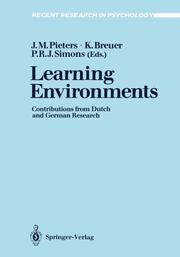Detailansicht
Learning Environments
Contributions from Dutch and German Research, Recent Research in Psychology
ISBN/EAN: 9783540529033
Umbreit-Nr.: 4375652
Sprache:
Englisch
Umfang: ix, 364 S.
Format in cm:
Einband:
kartoniertes Buch
Erschienen am 05.09.1990
Auflage: 1/1990
- Zusatztext
- InhaltsangabeGeneral Introduction.- Learning environments: An introduction.- I: Classroom Environments.- Facilitating adults' learning by coaching: Development and evaluation of an andragogical model of continuing vocational education within industrial companies.- Concepts of schooling and the learning environment: A relationship tested in law faculties.- Work simulation: A natural environment for learning job skills and job attitudes.- Teacher enthusiasm: Congruence between ratings and behaviour.- Teacher praise and classroom climate: Another paradoxical relation.- II: Evaluation of Learning Environments.- Assessing the quality of kindergarten environments with the Early Childhood Environment Rating Scale.- School-provided measures against truancy and drop-out.- Some school effectiveness indicators and their relation to school characteristics.- III: Computer-Based Environments.- The use of a computer microworld as a learning environment to develop conceptual change in the field of mechanics.- Intelligent tutoring system for learning English.- A genetic model for tutoring addition and subtraction skills in an adaptive computer program.- A production system explaining errors in long division of learning disabled students in junior vocational education.- A computer simulation of the acquisition of a computational skill in a discovery-oriented microworld.- A systematic problem approach in business administration: A methodology to make knowledge explicit for Computer-Assisted Instruction.- On the surplus of computerized traffic education.- IV: Environments for Meta-Learning.- Metacognition: Learning to learn and learning to think.- General and differential effectiveness of learning-to-learn programs.- Teaching problem solving in higher education: From field regulation to self-regulation.- Executive control, self-regulation trained in mathematics.- Children's reflection on text-coherence during reading.- The Leittext method: Learning to learn in commerce and industry.- Training self-regulation in several educational fields.- V: Theoretical Issues of Learning Environments.- Measuring individual differences in cognitive processes: How a speed-accuracy methodology can improve the results.- The influence of topic interest, prior knowledge and cognitive capabilities on text comprehension.- Instructional implications of recent research and empirically-based theories on the effect of prior knowledge on learning.- Contributors' addresses.
- Autorenportrait
- InhaltsangabeGeneral Introduction.- Learning environments: An introduction.- I: Classroom Environments.- Facilitating adults' learning by coaching: Development and evaluation of an andragogical model of continuing vocational education within industrial companies.- Concepts of schooling and the learning environment: A relationship tested in law faculties.- Work simulation: A natural environment for learning job skills and job attitudes.- Teacher enthusiasm: Congruence between ratings and behaviour.- Teacher praise and classroom climate: Another paradoxical relation.- II: Evaluation of Learning Environments.- Assessing the quality of kindergarten environments with the Early Childhood Environment Rating Scale.- School-provided measures against truancy and drop-out.- Some school effectiveness indicators and their relation to school characteristics.- III: Computer-Based Environments.- The use of a computer microworld as a learning environment to develop conceptual change in the field of mechanics.- Intelligent tutoring system for learning English.- A genetic model for tutoring addition and subtraction skills in an adaptive computer program.- A production system explaining errors in long division of learning disabled students in junior vocational education.- A computer simulation of the acquisition of a computational skill in a discovery-oriented microworld.- A systematic problem approach in business administration: A methodology to make knowledge explicit for Computer-Assisted Instruction.- On the surplus of computerized traffic education.- IV: Environments for Meta-Learning.- Metacognition: Learning to learn and learning to think.- General and differential effectiveness of learning-to-learn programs.- Teaching problem solving in higher education: From field regulation to self-regulation.- Executive control, self-regulation trained in mathematics.- Children's reflection on text-coherence during reading.- The Leittext method: Learning to learn in commerce and industry.- Training self-regulation in several educational fields.- V: Theoretical Issues of Learning Environments.- Measuring individual differences in cognitive processes: How a speed-accuracy methodology can improve the results.- The influence of topic interest, prior knowledge and cognitive capabilities on text comprehension.- Instructional implications of recent research and empirically-based theories on the effect of prior knowledge on learning.- Contributors' addresses.
